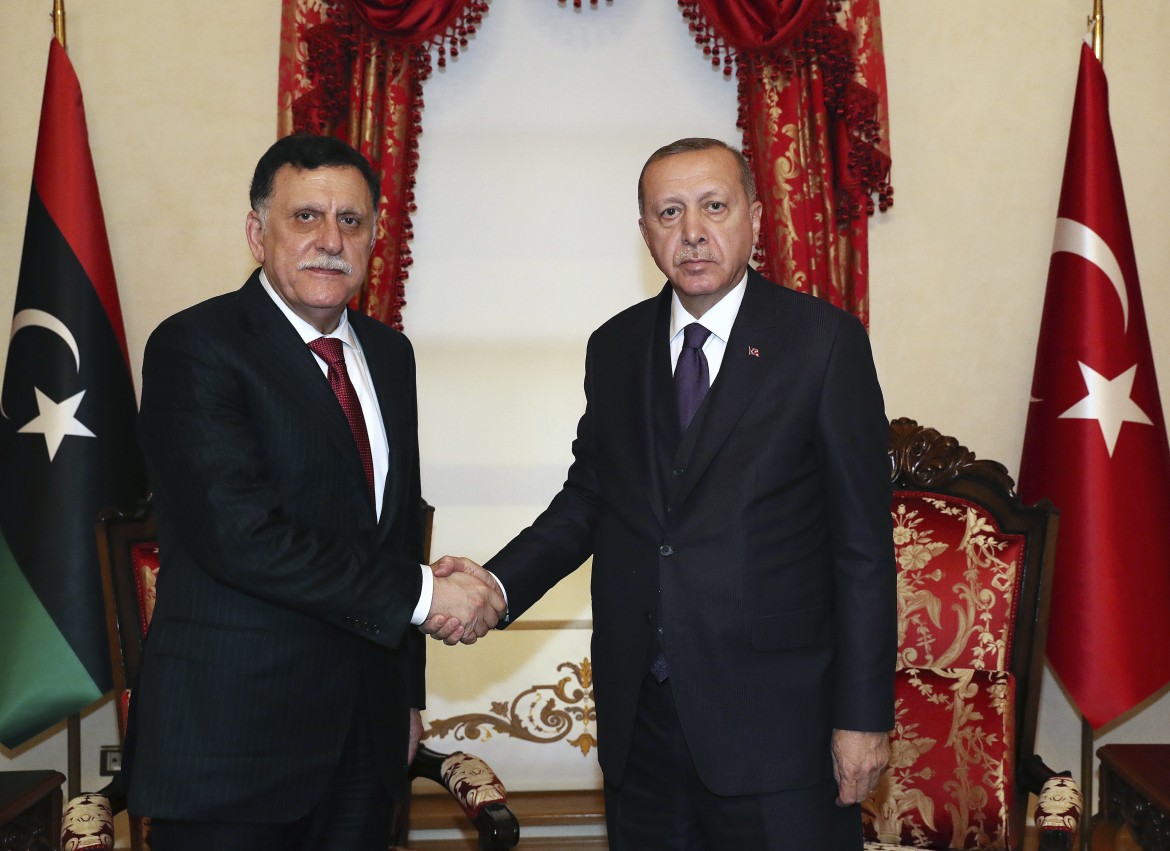Commentary
Turkish strongman backs Tripoli as Italy looks on helplessly
The truth is we are on the margins of the international situation, and we are unwilling to understand this.

We have ended up in the hands of Erdogan (and Putin): the real “strongmen” which correspond to the aspirations of the unwise Italians, as Norma Rangeri described in her latest op-ed. Given that we’re unable to decide anything, we need not fear: the Turks will do it for us.
With the approval from parliament in Ankara to send soldiers to Tripoli to fight General Khalifa Haftar, Italy is becoming more and more of an “ally” to Erdogan, having constantly supported the government of al-Sarraj so far, despite Conte and Di Maio’s latest swerve toward Haftar, the general ruling the Cyrenaica region.
This is a paradoxical situation, because Erdogan is also one of our adversaries. With the Mediterranean pact that it has just signed with Sarraj’s Libya, Turkey has also claimed the right to exploit the offshore gas resources found in the exclusive zone belonging to Greek Cyprus, in competition with the Italian ENI and the French Total. The text of the document voted on Thursday in Ankara explicitly mentioned that Turkey intends to defend these interests.
As the proverb goes, “spoken words fly away, written words are here to stay,” despite the fact that our diplomacy has been trying to curb Turkish ambitions for months. In Ankara, these efforts bring to mind echoes of 1911, when Italy first took Libya and then the Dodecanese Islands from the Ottoman Empire.
Accordingly, Turkey is raising the stakes for Tripoli, in view of the upcoming meeting in Ankara on Jan. 8 between Putin and Erdogan, the pair of frenemies who will now decide the fate of Syria, Libya and also, at least in part, the gas reserves. An important factor is the recent inauguration of the Turkish Stream pipeline, an explicit countermove to the project of the Eastern Mediterranean gas pipeline on the route Egypt-Israel-Cyprus-Greece, something like an unprecedented inter-religious alliance between Muslims, Jews and Orthodox Christians, dictated by strong economic and strategic interests.
Now, the leadership in Rome should be asking themselves some questions. Whose side are we on in Libya? What are we going to do with our 300 soldiers in Misrata, guarding a hospital, in the event of an escalation of the conflict, something we dearly hope will not happen?
The truth is that we are neither fish nor fowl. We are not with al-Sarraj—a government recognized by the UN, but one that no one wants because it is being propped up by the Muslim Brotherhood. We are not with Haftar, a general whose military successes are doubtful. And we are not even really neutral, because we bombed Libya in 2011 to take out Gaddafi, our biggest ally in the Mediterranean, not even six months after we received him in Rome with pomp and circumstance for the signing of security agreements and billion-dollar contracts approved by 98% of our parliament.
Most crucially, we don’t even know what we’re doing here in the Mediterranean, apart from rejecting or receiving refugees depending on the political winds as well as the weather. Even as it is described in the end-of-year speech by the President of the Republic, Italy seems to be floating along in a void: “The beautiful country stretched out in the Mediterranean,” as he says, is surrounded by wars and conflicts, and we are not able to be a “meeting place” for anything at all. We are on the margins of the international situation, and we are unwilling to understand this.
We supported al-Sarraj because Tripolitania is host to our major energy interests and ENI’s activities (the Green Stream gas pipeline) and because our governments are financing the Coast Guard in Tripoli, a sort of mythical Tortuga in the Maghreb that lets people die at sea, or at most takes them back to a so-called “safe port” that is actually a wretched hive of every evil known to man.
For some time now, we have been snubbing not only Haftar, but also Moscow’s offers to mediate with Benghazi and Tobruk. Our governments must have raised their eyebrows at this prospect: us becoming involved with the Russians? Perish the thought. Instead, they have been messing around with the false American promise that we would be in the mythical “control room” for Libya. In reality, our leaders are always afraid of taking any decision in autonomy from the United States—as if the others even asked us for our opinion when they decided to take out Gaddafi.
Our strategists have not understood, or are pretending not to understand, something that Erdogan—but also Macron—grasped a long time ago: NATO has been reduced to near-nonexistence as an effective and useful alliance for the states that are part of it.
It’s no coincidence that the Americans are packing up and preparing to move out of Turkey, which has military agreements with Russia and Iran: Incirlik is no longer a secure base for them. And there’s a significant likelihood that they’ll transfer their atomic bombs here in Italy.
And not only: the Americans are transferring their “smart bombs” and bunker-buster bombs to Iraq, just in case the US, egged on by Israel, decides to bomb Iran. This is the real reason behind the events that have taken place in Iraq, and the reason why Tehran’s allies in the Shiite world are positioning themselves for this eventuality.
None of this, from Libya to the Middle East, is even a topic of discussion here in Italy. That’s because Italy is not really “stretched out into the Mediterranean,” as our respectable president said, but rather looking down from a balcony into the dark, as masters new and old pass on by.
Originally published at https://ilmanifesto.it/luomo-forte-decide-sulla-libia-l-italia-brancola-nel-buio/ on 2020-01-03
